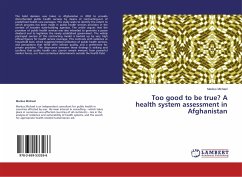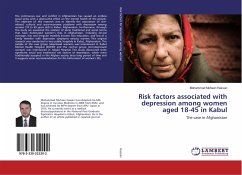
Too good to be true? A health system assessment in Afghanistan
Versandkostenfrei!
Versandfertig in 6-10 Tagen
27,99 €
inkl. MwSt.

PAYBACK Punkte
14 °P sammeln!
The bold decision was taken in Afghanistan in 2002 to provide donorfunded public health services by means of contracting-out of predefined health care packages. This study seeks to identify the extent to which progress has been made in public health services provision in the context of broader state-building agendas. The article argues that the provision of public health services was also intended to generate a peace dividend and to legitimize the newly established government. The widely portrayed success of the contracting model is backed up by very high official figures for health service co...
The bold decision was taken in Afghanistan in 2002 to provide donorfunded public health services by means of contracting-out of predefined health care packages. This study seeks to identify the extent to which progress has been made in public health services provision in the context of broader state-building agendas. The article argues that the provision of public health services was also intended to generate a peace dividend and to legitimize the newly established government. The widely portrayed success of the contracting model is backed up by very high official figures for health service coverage. This contrasts with evidence at household level, which suggests limited utilization of public health services, and perceptions that these offer inferior quality, and a preference for private providers. The dissonance between these findings is striking and confirms that public health care cannot remain immune from powerful market forces, nor from contextual determinants outside the health field.












